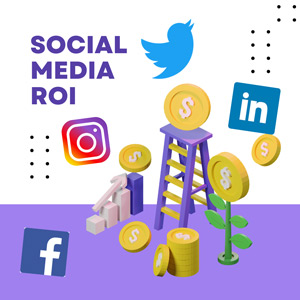
If you are a marketer, you have probably been asked about the real value of social media. Maybe your company or management team has had some preconceived notions about online platforms or maybe you simply want to show the value of what your role is in the company’s broader objectives. Either way, it’s important to understand how to convey the role social media plays in your brand’s place in the industry. To do this, you need to know how to talk about social media’s return on investment, or ROI. This is the time and money spent on social media, and what your company gets back out of it.
To learn more, I recently took a webinar on this very topic. The first important thing I learned is that ROI differs from value. The webinar hosts defined “ROI” as the sum of all social media actions that show tangible monetary return from your financial investment, such as an e-commerce campaign that seeks to get conversions and sales online. Value, however, is a broader view of ROI that seeks to measure the more intangible, but still important, value added. An example of this can be a brand awareness campaign on social media.
ROI is not always revenue. Sometimes it’s great customer service moments. Good customer experience has an impact on revenue. To get a bigger picture of your company’s social media ROI, consider these four ways to measure it:
- Calculating your true investment in social media (how much time and money is being spent?)
- Setting goals that connect to your business and your objectives (what endpoint do you have in sight?)
- Establishing a measurement framework that fits your organization (what benchmarks are realistic and attainable for your company?)
- Calculating and attributing the impact of your social strategy on revenue and business goals (where did social media come into play in your company’s wins?)
When it comes to that second point, the hosts recommended setting “SMART” goals, or ones that are Specific, Measurable, Attainable, Relevant and Time-bound, meaning you have a set deadline by which you wish to see results.
Another note about ROI: Consider social media’s role in helping your company to attract talent, and the ways in which your social media presence shows your company’s culture and highlights its brand as an employer – not just as a company. To this end, keep in mind that social media influencers can be internal! Consider having an employee be a brand ambassador from an employer point of view.
These are just some things to consider as your team sets future social media goals. ROI is important, but value is what you can really showcase to management when it comes to social media.



